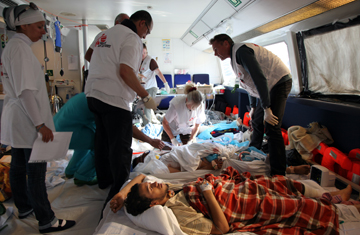
Medics from Doctors Without Borders offer their services on April 16, 2011, in Libya, where NGOs are preparing for a potential mental-health crisis
(2 of 2)
Although Libyan education was free and valued under the Gaddafi regime, the subject of mental health was often missing from curricula and psychological training was short and unstructured, leaving many Libyan psychologists to turn to Google to learn how to diagnose mental-health problems and conduct psychotherapy, says Weissbecker. Social-work training is also poor, and the profession is underappreciated. With only the option of the two centralized hospitals, Libyans with mental-health issues worry that they can't seek treatment in private, which further stigmatizes the act of getting help. Severy of Doctors Without Borders recalls a case in which a woman traveled to a different country to see a psychiatrist to avoid judgment from family and friends. As a part of the transition, nonprofits like International Medical Corps are advocating for nationwide mental-health services available at every hospital.
Psychologists and social workers are "really crying out for training," says psychiatrist Elhady. "They feel this is their duty and they have to do something." She considers herself inexperienced in treating posttraumatic stress disorder (PTSD) — "Even some of the most senior psychiatrists [in Libya] say, 'We never dealt with any PTSD cases'" — and notes that even the International Medical Corps training is very basic. But the organization plans to provide more long-term, specialized programs, including counseling and cognitive-behavior training, in the future.
In the meantime, classrooms have become a focal point for the building up of Libya's new mental-health services. Teachers and students, both expecting normal behavior from the other, are struggling to deal with the erratic reactions that come with postconflict psychological stress. "Everybody is quite different now, and that's what we're trying to explain," says Maria Palha, a psychologist for MSF based in Misratah. Mothers of freedom fighters are also going through a difficult grieving process, as they are expected to accept the deaths of their loved ones as "Allah's destiny," Palha says. "Only when they are in individual consultation, do they reveal that they feel guilty because they are sad due to the loss of their sons."
International Medical Corps and Doctors Without Borders have been setting up mental-health programs in war-torn regions since the 1980s, in places such as Afghanistan, Uganda, Iraq and Yugoslavia. Whether or not the programs are working is hard to tell. "It's difficult to find relevant tools adapted culturally to evaluate the impact," says Severy, adding that the most obvious way is to see if patients continue to access and accept mental-health services.
But regardless of potential past success, some experts are against the kind of medical intervention that the two organizations are offering in Libya. Derek Summerfield, a psychiatrist and teaching associate at the Refugee Studies Centre at the University of Oxford, says that imposing Western mental-health services on a population like Libya's is a "grotesque assumption and a waste of everyone's time and money." According to Edgar Jones, a professor at the Institute of Psychiatry at King's College London, "There's a danger you could do more harm than good. Western nations have made the error in the past of going into African states thinking they can apply Western treatment."
But both Doctors Without Borders and International Medical Corps contend they use a cultural approach in establishing a mental-health infrastructure wherever they go. In Libya, Weissbecker of International Medical Corps works with locals like Elhady to ensure the training is sensitive to local communities. And Doctors Without Borders has formed advisory committees composed of locals, primarily women, who are for the first time able to express themselves without social constraint. "Right now there is still a lot of volunteering and good will and changes. I think it will be really important for people to be supportive of those changes," says Weissbecker. "This is really a crisis that can be changed into an opportunity."
